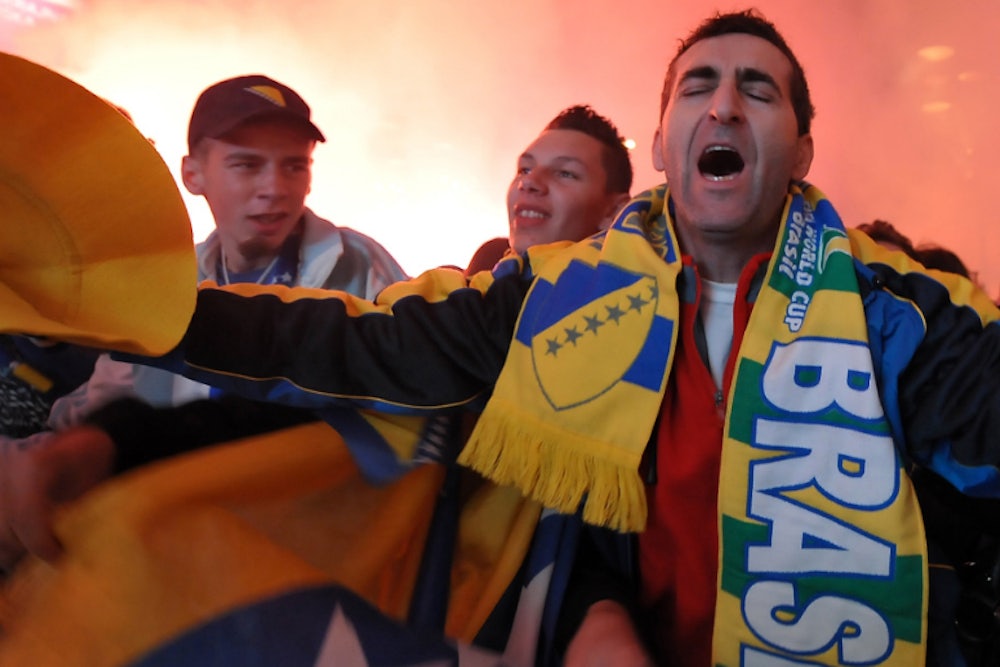The last time a Bosnian kicked the ball in a World Cup was on June 30, 1990.
It happened in Florence, Italy, in the penalty shootout deciding the game between Yugoslavia and Argentina. His name was Faruk Hadžibegić, and he kicked the ball at Goycochea, who stopped it, thereby taking the Maradona-lead Argentines to the semifinals, where they eliminated Italy with Caniggia’s goal, only to lose to Germany in the final. Yugoslavia, along with its national team, disintegrated within a year, which lead to the war that made Bosnia famous. The Yugoslav team coach at the time, Ivica Osim, was—and is—Bosnian. The current coach of the Bosnian national team, Safet Sušić, played in that game as well. One might thus be tempted to see the Bosnians’ meeting the Argentines on Sunday as a completion of some kind historical circle, or, at least, a cycle.
The temptation, however, is fully resisted in Sarajevo, where I’m writing this. Nobody could care less. The upcoming game, on June 15, is not seen as a late symbolic conclusion of the mournful story of Yugoslavia and its famed disintegration, but rather as Bosnia and Herzegovina’s well-earned appearance on the World Cup stage. Against all odds, Bosnia, the only debutant in this year’s World Cup, has joined the big boys.
Which is to say that the Bosnian media has deployed a number of crews and correspondents to Brazil, at a great expense for any business operating in a perpetually collapsing economy. The freshest information regarding the Dragons (Zmajevi) is perpetually available, much of it picked up in press conferences or on the sidelines of their training sessions. In other words, providing content is a serious problem.
Dnevni avaz, the Bosnian daily that is, for my money, always and steadfastly in contention for the worst newspaper in the world, reported, among other things, that a Brazilian journalist gave the coach Sušić what is purported to be a lucky necklace; that the president and vice president of the Bosnian football association “made Brazilian policemen in Guaruja [where the Bosnian team base is] happy by distributing small promotional gifts.” The Dnevni avaz correspondent, who singlehandedly filed a full spread, conjured up some bottom-of-the-barrel filler with an article (entitled "Empty Stomach") about his struggles with finding affordable and palatable food, what with high prices, lack of English-language menus and the fact that Brazilian bananas look and taste entirely differently from the kind he’s used to in Bosnia. He ends his story on the peculiarities of Brazilian cuisine revealing “possibly the biggest problem—bread is nowhere to be found.”
Bread—the essential part of Bosnian diet—is hard to find in many parts of Bosnia as well. In addition to the country being the poorest one in Europe, the recent floods were particularly devastating in its breadbasket in the north—serious food shortages might hit the population before the soccer fever is dispelled. But such problems will be dealt with (or not) later, after Bosnia is eliminated from the World Cup. In the unlikely event of the Dragons winning the World Cup, the need for bread and food—a symptom of humbling mortality—is likely to be altogether eliminated.
Meanwhile, TV screens are being mounted in coffee shops, bars and restaurants all over Sarajevo for the enjoyment of its bread-loving citizens, while a few squares now feature stages where celebratory entertainment will be provided. The Liberation Square was renamed The Dragon’s Nest, the new name invoking not only the fire-breathing national team, but also the movie Enter the Dragon, starring Bruce Lee, to whom a monument was erected in Herzegovina. The reality—harsh as it might be—is being presently realigned or even temporarily suspended all over Bosnia and Herzegovina. This is how bad it is: The regular pick-up soccer games are being cancelled until after the World Cup is over. Starting Sunday, any and all Bosnian soccer is to be played only by the Dragons.
